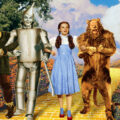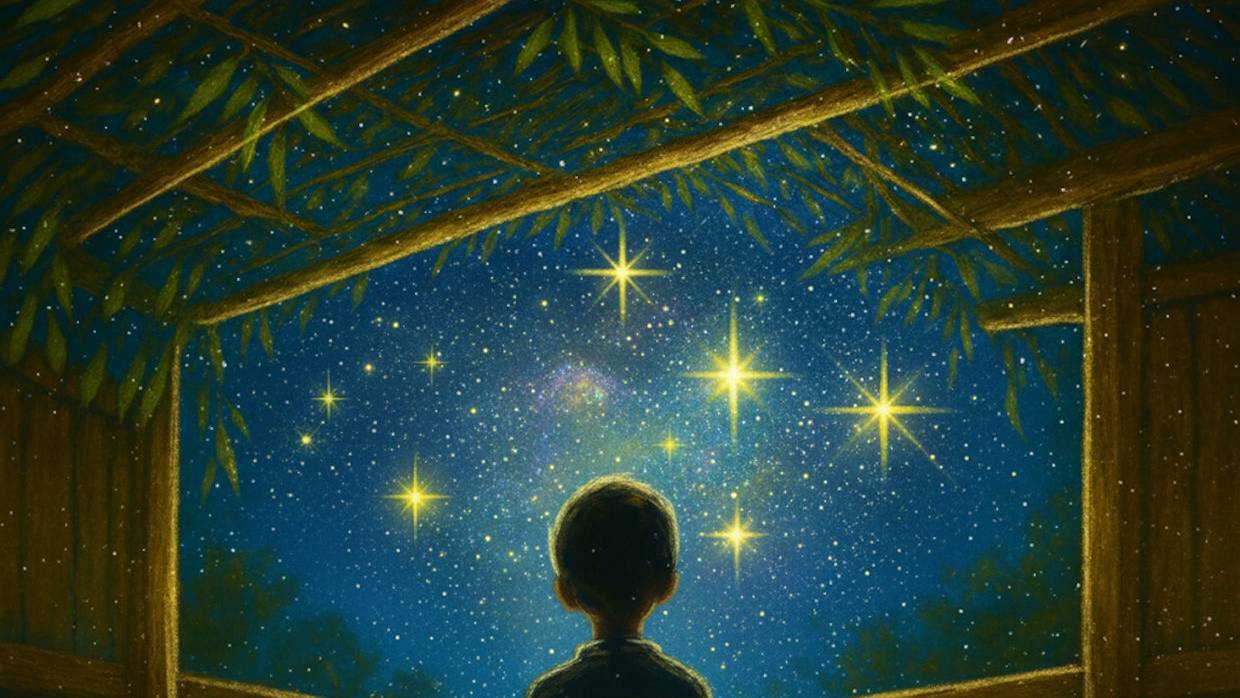 The Wizard of Oz and the Jews
The Wizard of Oz and the Jews


5 min read
Living in the sukkah, we discover a joy born from clarity: the peace of knowing where our true security lies.
The festival of Sukkot is called “the time of our rejoicing”. Why is Sukkot, of all holidays, singled out as the season of joy?
The answer lies in the sukkah itself. When we leave our solid homes with their sturdy roofs and protective walls, and move into a temporary dwelling covered with s’chach, the foliage roof through which we can see the stars, we attain a shot of clarity.
In our permanent homes, we can fall into the illusion of self-sufficiency. The mortgage is paid, the roof doesn't leak, the thermostat maintains a comfortable 72 degrees. It's natural – almost inevitable – to feel a sense of security that whispers, "I've got this. I've built this life. I'm in control."
In the sukkah, those whispers fall silent. Its flimsy walls and sparse roof tell the truth: we are vulnerable. We are dependent. We are not the ones ultimately in control. And paradoxically, in that acknowledgment of vulnerability comes an extraordinary sense of peace.
Throughout the year, we wrestle with fundamental questions that gnaw at the edges of our consciousness: Who really runs the world? Can I truly rely on God? Is my security real or illusory? Am I placing my trust in the right things?
These doubts are exhausting. They create a low-grade anxiety that we carry with us, even when we're not consciously aware of it. We're constantly hedging our bets, trying to maintain control, worrying about what might go wrong.
But in the sukkah, the doubt dissolves.
When you sit looking up at the sky, the answer becomes clear: The Almighty runs the world. He always has. The roof over our heads during the rest of the year, the bank account, the job security – none of it was ever the source of our protection. God was. God is. God will be.
This isn't naive optimism or wishful thinking. It's clarity. It's seeing reality as it truly is, stripped of our comfortable illusions.
There's something deeply liberating about accepting our dependence on God. When we stop pretending that we're the architects of our own security, when we stop exhausting ourselves trying to control every variable, we can finally breathe.
This is why the mitzvah is to live in the sukkah for seven days – not just visit it, not just eat a meal there, but actually dwell in it. The Torah wants us to marinate in this clarity. To let it seep into our bones. To internalize the truth that our security has always come from Above.
And as that truth settles in, something remarkable happens: we become genuinely joyful. Not because everything is going our way. Not because we've achieved perfect control over our circumstances. But because we know – with crystal clarity – who we can rely upon.
The challenge is carrying this clarity beyond the holiday of Sukkot. When we return to our permanent homes, will we remember what we learned in that temporary dwelling? Will we recall that all our structures are, in some sense, temporary? That our true security has always resided in our relationship with the Infinite?
This is why we're commanded to rejoice on Sukkot. The joy itself is part of the lesson. When we experience the deep happiness that comes from resolving our existential doubts, when we feel the peace that accompanies clarity about who runs the world, we create a powerful memory. That joy becomes a resource we can draw upon throughout the year.
The next time we're gripped by anxiety or uncertainty, we can close our eyes and remember: the joy and clarity of the sukkah. The peace of knowing that we're held, protected, and sustained by the One who truly runs the world.
Sukkot is called zman simchaseinu – the time of our rejoicing – because it is the festival of ultimate clarity. It is the time when our doubts are resolved and we see with perfect lucidity where our security truly lies.
As the Talmud teaches, there is no joy like the joy that comes from resolving doubt. There is no happiness quite like the happiness that emerges when we finally see clearly.
In the sukkah, we don't just commemorate the Clouds of Glory that protected our ancestors in the desert. We experience our own moment of protection, our own moment of truth. And in that fragile dwelling, paradoxically, we find the strongest foundation for joy.
As we prepare to celebrate Sukkot this year, may we merit to experience that deep joy that comes from clarity. May we sit in our temporary dwellings and see with fresh eyes the permanent truth: that we are held, sustained, and beloved by the One who runs the world. And may that joy – the joy of resolved doubt – stay with us throughout the year.
